Engage NY Eureka Math 4th Grade Module 5 Lesson 23 Answer Key
Eureka Math Grade 4 Module 5 Lesson 24 Problem Set Answer Key
Question 1.
Rename each fraction as a mixed number by decomposing it into two parts as shown below. Model the decomposition with a number line and a number bond.
a. \(\frac{11}{3}\)

Answer:
11/3 = 3(2/3).
Explanation:
In the above-given question,
given that,
Rename each fraction as a mixed number by decomposing.
11/3 = 9/3 + 2/3.
3 + 2/3.
3(2/3).
b. \(\frac{12}{5}\)
Answer:
12/5 = 2(2/5).
Explanation:
In the above-given question,
given that,
Rename each fraction as a mixed number by decomposing.
12/5 = 10/5 + 2/5.
2 + 2/5.
2(2/5).
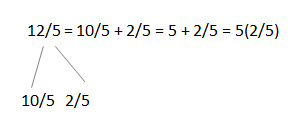
c. \(\frac{13}{2}\)
Answer:
13/2 = 5(3/2).
Explanation:
In the above-given question,
given that,
Rename each fraction as a mixed number by decomposing.
13/2 = 10/2 + 3/2.
5 + 3/2.
5(3/2).
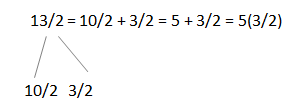
d. \(\frac{15}{4}\)
Answer:
15/4 = 3(3/4).
Explanation:
In the above-given question,
given that,
Rename each fraction as a mixed number by decomposing.
15/4 = 12/4 + 3/4.
3 + 3/4.
3(3/4).
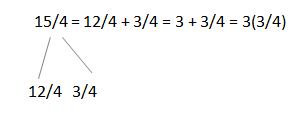
Question 2.
Convert each fraction to a mixed number. Show your work as in the example. Model with a number line.
a. \(\frac{11}{3}\)

Answer:
11/3 = 3(2/3).
Explanation:
In the above-given question,
given that,
convert each fraction to a mixed number.
11/3 = 9/3 + 2/3.
3 + 2/3.
3(2/3).
b. \(\frac{9}{2}\)
Answer:
9/2 = 4(1/2).
Explanation:
In the above-given question,
given that,
convert each fraction to a mixed number.
9/2 = 8/2 + 1/2.
4 + 1/2.
4(1/2).
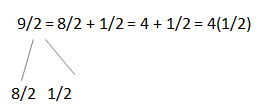
c. \(\frac{17}{4}\)
Answer:
17/4 = 4(1/4).
Explanation:
In the above-given question,
given that,
convert each fraction to a mixed number.
17/4 = 16/4 + 1/4.
4 + 1/4.
4(1/4).
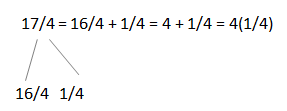
Question 3.
Convert each fraction to a mixed number.
a. \(\frac{9}{4}\) = 2(1/4).
Answer:
9/4 = 2(1/4).
Explanation:
In the above-given question,
given that,
convert each fraction to a mixed number.
9/4 = 8/4 + 1/4.
2 + 1/4.
2(1/4).
b. \(\frac{17}{5}\) = 3(2/5).
Answer:
17/5 = 3(2/5).
Explanation:
In the above-given question,
given that,
convert each fraction to a mixed number.
17/5 = 15/5 + 2/5.
3 + 2/5.
3(2/5).
c. \(\frac{25}{6}\) = 4(1/6).
Answer:
25/6 = 4(1/6).
Explanation:
In the above-given question,
given that,
convert each fraction to a mixed number.
25/6 = 24/6 + 1/6.
4 + 1/6.
4(1/6).
d. \(\frac{30}{7}\) = 4(2/7).
Answer:
30/7 = 4(2/7).
Explanation:
In the above-given question,
given that,
convert each fraction to a mixed number.
30/7 = 28/7 + 2/7.
4 + 2/7.
4(2/7).
e. \(\frac{38}{8}\) = 4(6/8).
Answer:
38/8 = 4(6/8).
Explanation:
In the above-given question,
given that,
convert each fraction to a mixed number.
38/8 = 32/8 + 6/8.
4 + 6/8.
4(6/8).
f. \(\frac{48}{9}\) = 5(3/9)
Answer:
48/9 = 5(3/9).
Explanation:
In the above-given question,
given that,
convert each fraction to a mixed number.
48/9 = 45/9 + 3/9.
5 + 3/9.
5(3/9).
g. \(\frac{63}{10}\) = 6(3/10).
Answer:
63/10 = 6(3/10).
Explanation:
In the above-given question,
given that,
convert each fraction to a mixed number.
63/10 = 60/10 + 3/10.
6 + 3/10.
6(3/10).
h. \(\frac{84}{10}\) = 8(4/10).
Answer:
84/10 = 8(4/10).
Explanation:
In the above-given question,
given that,
convert each fraction to a mixed number.
84/10 = 80/10 + 4/10.
8 + 4/10.
8(4/10).
i. \(\frac{37}{12}\) = 3(1/12).
Answer:
37/12 = 3(1/12).
Explanation:
In the above-given question,
given that,
convert each fraction to a mixed number.
37/12 = 36/12 + 1/12.
3 + 1/12.
3(1/12).
Eureka Math Grade 4 Module 5 Lesson 24 Exit Ticket Answer Key
Question 1.
Rename the fraction as a mixed number by decomposing it into two parts. Model the decomposition with a number line and a number bond.
\(\frac{17}{5}\)
Answer:
17/5 = 3(2/5).
Explanation:
In the above-given question,
given that,
Rename each fraction as a mixed number by decomposing.
17/5 = 15/5 + 2/5.
3 + 2/5.
3(2/5).
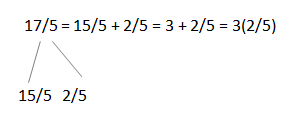
Question 2.
Convert the fraction to a mixed number. Model with a number line.
\(\frac{19}{3}\)
Answer:
19/3 = 6(1/3).
Explanation:
In the above-given question,
given that,
convert each fraction to a mixed number.
19/3 = 18/3 + 1/3.
6 + 1/3.
6(1/3).
Question 3.
Convert the fraction to a mixed number.
\(\frac{11}{4}\)
Answer:
11/4 = 2(3/4).
Explanation:
In the above-given question,
given that,
convert each fraction to a mixed number.
11/4 = 8/4 + 3/4.
2 + 3/4.
2(3/4).
Eureka Math Grade 4 Module 5 Lesson 24 Homework Answer Key
Question 1.
Rename each fraction as a mixed number by decomposing it into two parts as shown below. Model the decomposition with a number line and a number bond.
a. \(\frac{11}{3}\)

Answer:
11/3 = 3(2/3).
Explanation:
In the above-given question,
given that,
Rename each fraction as a mixed number by decomposing.
11/3 = 9/3 + 2/3.
3 + 2/3.
3(2/3).
b. \(\frac{13}{4}\)
Answer:
13/4 = 3(1/4).
Explanation:
In the above-given question,
given that,
Rename each fraction as a mixed number by decomposing.
13/4 = 12/4 + 1/4.
3 + 1/4.
3(1/4).
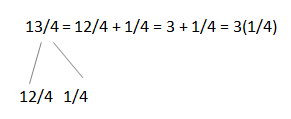
c. \(\frac{16}{5}\)
Answer:
16/5 = 3(1/5).
Explanation:
In the above-given question,
given that,
Rename each fraction as a mixed number by decomposing.
16/5 = 15/5 + 1/5.
3 + 1/5.
3(1/5).
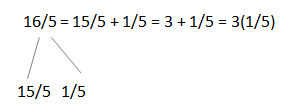
d. \(\frac{15}{2}\)
Answer:
15/2 = 7(1/2).
Explanation:
In the above-given question,
given that,
Rename each fraction as a mixed number by decomposing.
15/2 = 14/2 + 1/2.
7 + 1/2.
7(1/2).
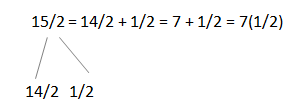
e. \(\frac{17}{3}\)
Answer:
17/3 = 5(2/3).
Explanation:
In the above-given question,
given that,
Rename each fraction as a mixed number by decomposing.
17/3 = 15/3 + 2/3.
3 + 2/3.
3(2/3).
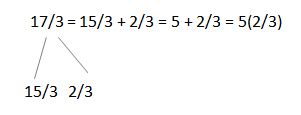
Question 2.
Convert each fraction to a mixed number. Show your work as in the example. Model with a number line.
a. \(\frac{11}{3}\)

Answer:
11/3 = 3(2/3).
Explanation:
In the above-given question,
given that,
convert each fraction to a mixed number.
11/3 = 9/3 + 2/3.
3 + 2/3.
3(2/3).
b. \(\frac{13}{2}\)
Answer:
13/2 = 6(1/2).
Explanation:
In the above-given question,
given that,
convert each fraction to a mixed number.
13/2 = 12/2 + 1/2.
6 + 1/2.
6(1/2).
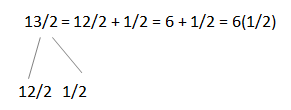
c. \(\frac{18}{4}\)
Answer:
18/4 = 4(2/4).
Explanation:
In the above-given question,
given that,
convert each fraction to a mixed number.
18/4 = 16/4 + 2/4.
4 + 2/4.
4(2/4).
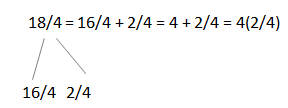
Question 3.
Convert each fraction to a mixed number.
a. \(\frac{14}{3}\) = 4(2/3)
Answer:
14/3 = 4(2/3).
Explanation:
In the above-given question,
given that,
convert each fraction to a mixed number.
14/3 = 12/3 + 2/3.
4 + 2/3.
4(2/3).
b. \(\frac{17}{4}\) = 4(1/4).
Answer:
17/4 = 4(1/4).
Explanation:
In the above-given question,
given that,
convert each fraction to a mixed number.
17/4 = 16/4 + 1/4.
4 + 1/4.
4(1/4).
c. \(\frac{27}{5}\) = 5(2/5).
Answer:
27/5 = 5(2/5).
Explanation:
In the above-given question,
given that,
convert each fraction to a mixed number.
27/5 = 25/5 + 2/5.
5 + 2/5.
5(2/5).
d. \(\frac{28}{6}\) = 4(4/6).
Answer:
28/6 = 4(4/6).
Explanation:
In the above-given question,
given that,
convert each fraction to a mixed number.
28/6 = 24/6 + 4/6.
4 + 4/6.
4(4/6).
e. \(\frac{23}{7}\) = 3(2/7).
Answer:
23/7 = 3(2/7).
Explanation:
In the above-given question,
given that,
convert each fraction to a mixed number.
23/7 = 21/7 + 2/7.
3 + 2/7.
3(2/7).
f. \(\frac{37}{8}\) = 4(5/8).
Answer:
37/8 = 4(5/8).
Explanation:
In the above-given question,
given that,
convert each fraction to a mixed number.
37/8 = 32/8 + 5/8.
4 + 5/8.
4(5/8).
g. \(\frac{51}{9}\) = 5(6/9).
Answer:
51/9 = 5(6/9).
Explanation:
In the above-given question,
given that,
convert each fraction to a mixed number.
51/9 = 45/9 + 6/9.
5 + 6/9.
5(6/9).
h. \(\frac{74}{10}\) = 7(4/10).
Answer:
74/10 = 7(4/10).
Explanation:
In the above-given question,
given that,
convert each fraction to a mixed number.
74/10 = 70/10 + 4/10.
7 + 4/10.
7(4/10).
i. \(\frac{45}{12}\) = 3(9/12).
Answer:
45/12 = 3(9/12).
Explanation:
In the above-given question,
given that,
convert each fraction to a mixed number.
45/12 = 36/12 + 9/12.
3 + 9/12.
3(9/12).